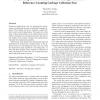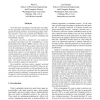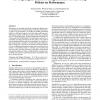113
Voted
IWMM
2007
Springer
15 years 8 months ago
2007
Springer
Numerous optimizations exist for improving the performance of nondeferred reference-counting (RC) garbage collection. Their designs are ad hoc, intended to exploit different count...
133
Voted
EMSOFT
2007
Springer
15 years 8 months ago
2007
Springer
The emergence of standards for programming real-time systems in Java has encouraged many developers to consider its use for systems previously only built using C, Ada, or assembly...
133
Voted
RTCSA
2007
IEEE
15 years 9 months ago
2007
IEEE
Given the major advantages of productivity and safety, the use of garbage collection (GC) in real-time systems has gained increasing attention. Guaranteeing garbage collection act...
128
click to vote
CGO
2007
IEEE
15 years 9 months ago
2007
IEEE
The JavaTM programming language does not allow the programmer to influence memory management. An object is usually allocated on the heap and deallocated by the garbage collector ...
128
Voted
CF
2009
ACM
15 years 9 months ago
2009
ACM
As multithreaded server applications and runtime systems prevail, garbage collection is becoming an essential feature to support high performance systems. The fundamental issue of...
115
Voted
IWMM
2009
Springer
15 years 9 months ago
2009
Springer
Magpie is a source-to-source transformation for C programs that enables precise garbage collection, where precise means that integers are not confused with pointers, and the liven...
145
Voted
IWMM
2009
Springer
15 years 9 months ago
2009
Springer
In this paper, we investigate the effects of using three different nursery sizing policies on overall and garbage collection performances. As part of our investigation, we modify ...
141
Voted
IWMM
2009
Springer
15 years 9 months ago
2009
Springer
: © Garbage Collection in the Next C++ Standard Hans-J. Boehm, Mike Spertus HP Laboratories HPL-2009-360 C++, garbage collection C++ has traditionally relied on manual memory mana...
110
Voted
PLDI
2009
ACM
15 years 9 months ago
2009
ACM
Software evolves to fix bugs and add features. Stopping and restarting programs to apply changes is inconvenient and often costly. Dynamic software updating (DSU) addresses this ...
112
Voted
WOSP
2010
ACM
15 years 9 months ago
2010
ACM
For garbage-collected applications, dynamically-allocated objects are contained in a heap. Programmer productivity improves significantly if there is a garbage collector to autom...





